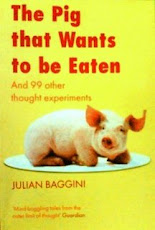Synopsis - Marge, Midge and Mungo are before a judge who must pass sentence over crimes they did, supposedly on the advice of others. Who then is to blame?
Who calls himself 'Mungo'?
Our lives start out absorbing the wisdom if others. Kids listen to parents and guardians, and learn that pots on stoves are usually hot and best left alone, playing in the rain can make one sick and a hosts of other life lessons. Unfortunately superstitions, bias and other quirks are equally handed down. Imagine if your parents told you to hurt cats because they are the spawn of the devil. Such advice, adequately drilled, would be detrimental to both child and nearby cats.
So givers should bear some responsibility over the actions of the recipient where applicable. And the 'where applicable' is a very important part of the argument. In today's context, the 'did you get it in writing?' or 'in black' circumstance makes for awesome finger pointing (the fleeting spoken word is never enough). Legally there's some measure of importance if advice is transmitted on paper. Perhaps also culpability of any crime as an outcome of the advice is also better assigned if the source of advice, and the advice proper, are known on paper. Always read the caveats though. Many who sue for losses from professional advice often miss out of waivers of culpability in little fine print at the bottom if the page.
We can't run away from seeking advice from professionals. How society defines professionals is a related debate. Doctors, lawyers, engineers and those with a piece of paper acknowledging their talent/skill are certifiably responsible for the advice they give. Astrologers, palm readers and psychics on the other hand can get away with everything but blaming it on the stars. Societies like Hong Kong and India put a lot of trust in feng shui masters and astrologers, and many seemingly absurd things are done on their advice. When absurd becomes criminal, the legal systems have to manage this situation with open minds on tiny paths. Blame is very hard to pin on such persons.
The judge in this story sought advice from his peers, other judges who serve to apply logic, reason and compassion to criminal adjudications. We presume their professional capabilities in this field. Their advice is usually right.
Thursday, March 18, 2010
Subscribe to:
Post Comments (Atom)
.jpg)
No comments:
Post a Comment